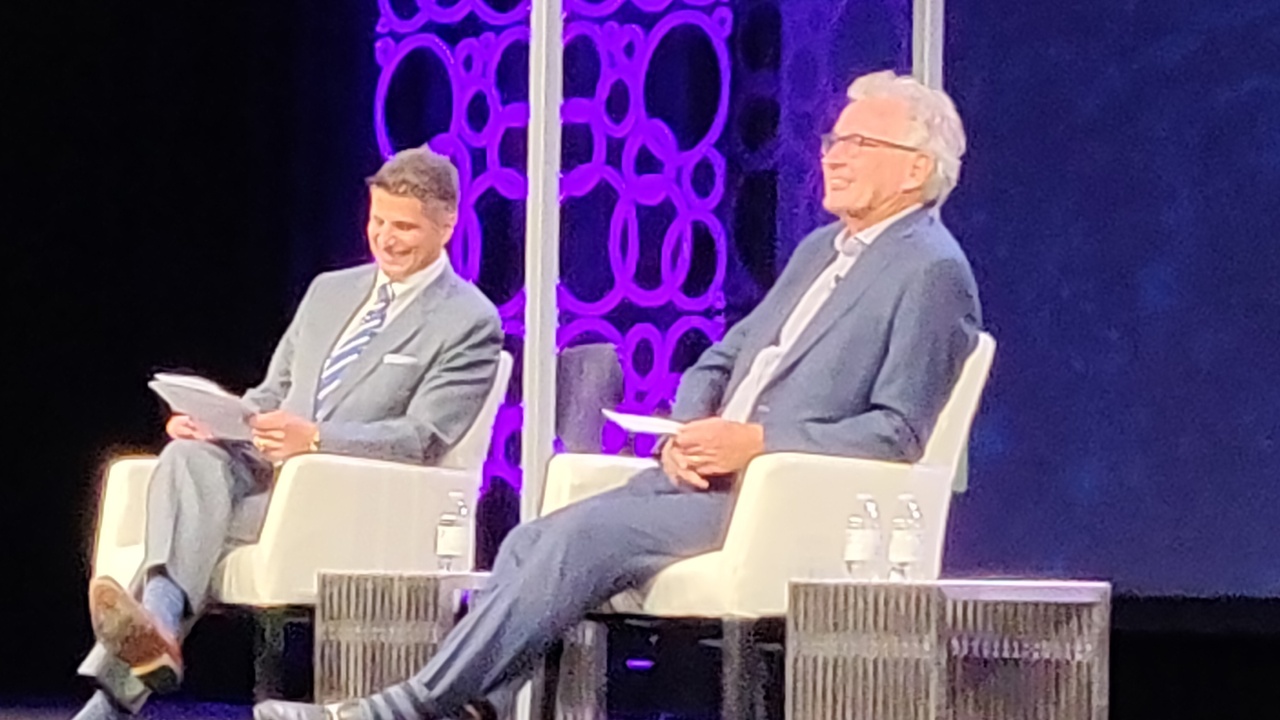"The Challenge Culture" from the Former Dunkin Chairman

(Part 3 of the Multi-unit Franchising Conference)
A couple of weeks ago I attended the Multi-unit Franchising Conference, and I’ve been sharing various blogs with the most interesting insights for your business success. In this post, I’m sharing the advice that Nigel Travis, CEO of Dunkin Donuts from 2009 to 2019, gave on how to transform your business culture.
To watch the whole Multi-Unit Conference series, subscribe to our YouTube Channel and leave us your e-mail at the bottom of this post to get a notification on when the rest of the information is published.
Nigel held executive-level positions in brands such as Papa John’s, Blockbuster, and Burger King, and he wrote the book “The Challenge Culture, Why the Most Successful Organizations Run on Pushback”, where he shares his management philosophy. The topic of his session moved around this mindset.
What’s a challenge culture? He clarified that it doesn’t mean that the structure or the people are constantly being challenged, or that the leadership gets questioned in a mean way. Having this culture implies that the organization thrives on pushback. Here are five things that you have to work on to successfully run this type of organization.
Build a free expression environment
One of your jobs as a leader is to provide a positive environment where anyone can feel safe to express themselves and give their opinion without repercussion. Also, everyone should also be able to ask anything to anyone.
Travis ensured that if people have a say in their work, they will be more engaged. This is a very important tip, especially nowadays with the staff crisis that’s happening in our industry, and what's happening in the economy.
Are your employees not performing the way you expect? Learn here three reasons this may be happening, and what to do about it.
Proactively listen to your customers, both internal and external
Many companies are managed outside-in through customer feedback, setting their key indicators based on the service score. And that's good because knowing what your customer wants is critical.
But Travis argues that specifically for franchises the approach should be more towards inside-out organizations, listening to what their franchisees have to say, because they're the ones dealing with the customers, the employees, and the brand every day.
If you are a franchisor, you need to speak with your franchisees, the staff in the units, and your corporate employees. Otherwise, you are missing out on a lot.
Have internal surveys
The former Dunkin Donuts CEO recommended that franchisees and employees should be surveyed every six months. These will help you have the temperature of what's happening in your organization.
We at The American Franchise Academy also recommend having these semestral surveys, whether it’s an employee satisfaction or an engagement survey, to get the information you need and make adjustments to operate better. Once you make the habit, you can make them annually.
Mind your franchisees’ feedback
CEOs should listen to the franchisees and their challenges so that they can adjust and improve their brand and their franchise systems.
I agree with that 100%. In many of the brands that I worked with, I had those constant interactions with their franchisees, collaborating with them in projects, product innovation, technology, and innovations, and it definitely made a difference. It works, it’s necessary, and the value that we got from those interactions was fantastic.
Improve the franchisor-franchisee relationship
To have a better relationship between both parts, Travis recommended fomenting communication, taking advantage of the technology tools such as email, virtual meetings, instant messaging, and so forth, and so on.
Besides, he urged CEOs and franchisors to have a constant debate with their franchisees. They should be invited to the table to debate on programs, products, equipment, or any project that is being launched to make sure that the proposal is well received.
He also recommended collaboration in decision-making, which means, listening to them and incorporate their feedback into the decisions.
The mantra should be “Better franchise relations and better franchise unit economics”.
Need help to improve those economics? Learn here why you should first know your break-even point.
The cake pops problem
Nigel shared a story that happened at Dunkin Donuts that summarized all the advice he gave. The original cake pops from Dunkin Donuts were only available in the franchise units, but the brand wanted to sell them in the retail channel. But they knew that they were going to have a challenge with their franchisees because, if the product could be bought in retail, they might lose profit.
So, they had to apply their pushback theory and invited the franchisees to the table to have healthy debates about it. Through collaboration and negotiation, they come up with a decision. Dunkin Donuts would share 50% of the profitability that came from retail sales of the cake pops with their franchisees.
In the end, Travis concluded that while the book talks about the importance of running a company on pushback and the challenge culture, the reality is that command and control don’t work. The days where the boss’s saying was set in stone are gone because that’s no longer the way to lead a company.
To have a challenging culture means that your people feel safe to share their thoughts about where they are and that they are able to ask anything to anybody so that you can improve your business. Love the book, love the concept. And I hope that this was of value to you.
If you like this type of information and knowledge and want to get more tools to become a successful business owner, subscribe to our YouTube channel to see our video tips and franchisee interviews.
Reflections:
- How often do you take the time to talk to your employees and/or franchisees?
- Have you implemented internal surveys?
- How’s your franchisor-franchisee relationship?
- What can you do to improve your organization’s culture?
WATCH THIS VBLOG on YouTube HERE



